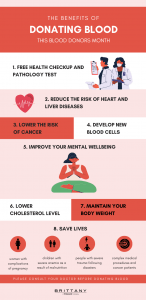BLOGS
Benefits of Donating Blood This Blood Donors Month
Donating blood can be quite scary for first-timers. However, there are numerous benefits to donating blood, which totally outweigh the few possible temporary side effects. In fact, a healthy person can donate at least once every three months, depending on the type of blood donation.

Donating blood can be a very rewarding experience
Do not worry because you are required to be thoroughly checked by a medical professional present at the donation center. You will need his or her endorsement in order to be qualified to donate blood, so that you won’t be suffering from any side effects such as nausea and weakness of the body.
Today’s New Normal may prevent people from voluntarily donating blood. However, the need for blood and platelets is constant and volunteer donors are the only source of blood for those in need. As hospitals resume surgical procedures and patient treatments that were temporarily paused due to the COVID-19 pandemic, donors are urged to give now to ensure blood products are readily available for patients.
Rest assured, private hospitals use sterile, disposable needles and syringes. They are practicing standard procedures to sanitize medical facilities, limit capacity through online bookings, and ultimately negate the spread of the virus. You may contact them beforehand to inquire about their health protocols for your peace of mind.
You may always find this article useful as well even if you decide to donate blood once the world is 100% COVID-free.

Always consult your doctor before deciding to donate blood to your local health service provider
What to Consider Before Donating Blood
The first thing that you should think of when donating blood is your eligibility. To ease the process, you may consult your resident family doctor who most likely knows whether or not you and your family are qualified to donate blood. Make sure to consult him/her online from your luxury home to avoid exposure.
Who are Qualified to Donate Blood?
If you don’t have a personal doctor to help you in preparing for your blood donorship, we’ve got you covered! Here are the minimum qualifications to be a blood donor:
- Weight is at least 50 kg
- Must be in good physical health
- Should pass the initial blood sampling screening
- Should be well rested and hydrated
- Not anemic
If you are someone with tattoos and/or body piercings, you are still eligible to donate blood if the tattooing procedure or the piercing was done a year ago. This is also applicable to acupuncture, and other procedures involving needles.
Upon arriving at the donation center, the medical representative will be performing a short checkup on you to observe whether you meet the following requirements:
- Blood volume collected will depend mainly on your body weight
- Pulse rate: Between 60 and 100 beats per minute with regular rhythm
- Blood pressure: Between 90 and 160 systolic and 60 and 100 diastolic
- Hemoglobin: At least 125 g/L

Brittany Corporation’s infographic showing the benefits of being a regular blood donor
The 8 Benefits of Donating Blood
Free Health Checkup and Pathology Test
Medical checkups can be quite expensive, more so specialized tests. However, an added benefit to donating blood is the free health checkup and pathology test. A pathology test is a test that examines samples of your body’s tissues, including your blood, urine, feces, and other samples obtained by biopsy. Doctors use this information for the diagnosis and treatment of diseases and other conditions.
For those who don’t visit their doctor for regular checkups, this is definitely a benefit you would want to take. Being examined will give you an idea early on of potential health problems your body may be facing that you otherwise wouldn’t have known yourself.
You are tested because of the abovementioned requirements in donating blood. Of course, the medical representative attending to you is obliged to inform you of any alarming findings. You may also request a copy of your medical checkup results.
Donating Blood Reduces the Risk of Heart and Liver Diseases
Iron is a mineral that the body needs for growth and development. Your body uses iron to produce hemoglobin–a protein in red blood cells that carries oxygen from the lungs to all parts of the body–and myoglobin–a protein that provides oxygen to muscles. Your body also needs iron to produce certain hormones.
Excess iron is stored in your organs, especially your liver, heart, and pancreas. Too much iron can lead to life-threatening conditions, such as liver disease, heart problems, and diabetes.
As a blood donor, you’re able to get rid of 225 mg to 250 mg of iron, which can significantly help prevent your body from iron overload. After donating blood, the donor’s hemoglobin levels are back to normal after 6 to 12 weeks on average.
That is why there is a recommended number of weeks/months between donations. Make sure to strictly follow this timeline to ensure that you don’t risk lowering your hemoglobin levels in the long term. If you can’t keep up with the timelines, no worries because you will be given a donation card to record the dates and other details of your donation.
Lower the Risk of Cancer by Donating Blood
As mentioned above, iron accumulation in the body can cause health complications. However, it is important to note that the risks can go as far as increasing the risk of chronic diseases, including colorectal cancer.
In fact, cancer risk increases among women after menopause since their body no longer has a way of eliminating excess iron. Since donating blood regularly helps you balance the iron levels in your body, your risk for various types of cancer becomes lower too.
Donating blood can help foster a healthier lifestyle
You Develop New Blood Cells when Donating Blood
The average adult has around 10 pints of blood (roughly 8% of your body weight). Astoundingly, an average blood donation is 1 pint of your blood supply. This loss signals your body to pump out a generous amount of blood to replace what has been donated.
The amazing thing about our bodies is that it generates about 2 million new red blood cells every second, so it only takes a number of weeks to build up stores of them again.
Why is developing new blood cells a good thing? Adequate blood benefits the body through its components. Red blood cells carry oxygen through your body to your heart and brain, and we all know how important oxygen is. Platelets help to prevent or control bleeding due to low platelet count. Plasma and cryoprecipitate also help in that aspect.
Now imagine a whole bunch of these newly pumped blood cells working to rejuvenate you!
Donating Blood Improves Your Mental Wellbeing
The positive mental effects of donating blood don’t come from new blood cells generated in your body. Rather, these are felt right after your donation, once you realize the potential lives you can save with this selfless act–it is a donation after all.
Not only are you healthier, but you also help complete strangers live. In fact, you are able to save three lives with every pint of blood donated. This new way of helping others in need can be motivating and will definitely encourage you to donate regularly.
Thus, donating blood improves emotional well-being in tandem with the physical benefits. It reduces stress, helps get rid of negative feelings, and provides a sense of belonging.
Lower Cholesterol Level
Donating blood lowers your blood lipids, which are all the fatty substances found in the blood, including cholesterol and triglycerides. Some people have too much cholesterol (fat) in their blood, and this increases their chances of having a heart attack.
Although increased blood lipids can come from a variety of factors, there is no denying that lifestyle and habits heavily affect your body. If you live in a luxury home in the Philippines, you might be at risk because common Filipino dishes are usually fried, fatty, processed, and high in trans fat–also known as bad cholesterol. Make sure to avoid unhealthy food.
When you donate blood, you get rid of excess amounts of lipids or fatty substances in your blood. This is important so that fat deposits don’t accumulate in your arteries, lowering your cholesterol level and your risk for heart disease.
Donating Blood Helps you Maintain Your Body Weight
An average blood donation is 1 pint of your blood supply. Replenishing your body with this same amount of blood burns approximately 650 calories, which is equivalent to about 1 hour of cardio.
New blood cells generated by your body after donating blood are better at holding and transporting oxygen than old blood cells that are wearing down, which gives your muscles and metabolism a helpful boost. As your body receives more oxygen, your energy level increases, and your body naturally burns more calories during its daily activities.
You Save Lives When You Donate Blood
There are no substitutes for blood, platelets, or plasma, meaning they cannot be manufactured. Without blood donation, patients can’t undergo surgeries, recover from illnesses, or just function on a daily basis. Patients in need of blood or blood products must rely on donations from donors.
More than 1 million people every year are diagnosed with cancer for the first time. Many of them will need blood, sometimes even daily, during chemotherapy. More than 38,000 blood donations are needed every day. However, Type O-negative and Type AB plasma, which are blood types that can be transfused to people with any blood type, are rare and supplies are low.
With this in mind, donating blood can be the highest form of humanitarian act.

Don’t forget to practice health protocols and keep your luxury home clean
COVID Measures at Home After Donating Blood
After donating blood, it is imperative that you take the proper precautionary measures to ensure that any exposure you may have to the COVID-19 virus won’t spread into your luxury home and to your loved ones.
After all, even if the blood donation center or hospital you went to took the right measures against the spread of the virus, any exposure in the time between leaving your home and arriving at the hospital and vice versa should be addressed.
As much as possible, only those who are donating blood should come to the donation site. Upon coming home, make sure that your luxury home entrance has all the necessary disinfectants an outsider must use before entering. There should be a clean set of clothes you can change into there, and a rack for all your exposed clothes. Don’t forget to place a trash bin where you can throw your disposable masks and gloves. Leave your shoes outside for cleaning and sun drying.
After spraying yourself with alcohol, don’t lounge in your luxury living room or bedroom. The first thing you should do inside the home is to take a full shower to wash off any outside agents that could also bring in sicknesses which would make your family vulnerable.

Luxury mansion at Portofino in Vista Alabang by Brittany Corporation
Invest in a Luxury Property Near Key Establishments
During the pandemic, we have seen a trend of high net worth individuals and families living in luxury condominiums transferring to more spacious ready homes in exclusive developments with houses and lots for sale. This is brought about by the demand for a safer and more sustainable environment.
The issue here is that luxury condominiums for sale are often the choice for families who prioritize convenience and location; and they give that up by moving to more ideal spaces during the pandemic, such as houses and lots for sale in Tagaytay. However, the first to come to mind is a new property somewhere in the province, sacrificing convenience for safety.
At Brittany Corporation, you will be pleased to find that all properties are master-planned developments in key locations within the metro south. Portofino in Vista Alabang, for example, is an exclusive residential community with everything within reach. It’s conveniently located next to Evia Lifestyle Center, an upscale establishment for all your retail, food, and home needs. It is also within a couple of minute’s drive to hospitals, schools, and tourist spots.
Complete with top-notch amenities and green space to breathe, check out our other world-class developments: Crosswinds in Tagaytay, La Posada in Sucat, and Promenade at Brittany Sta.Rosa.
During these trying times, we must stay vigilant and careful. Live in a spacious and breathable yet beautiful home, while being close to medical institutions.

















